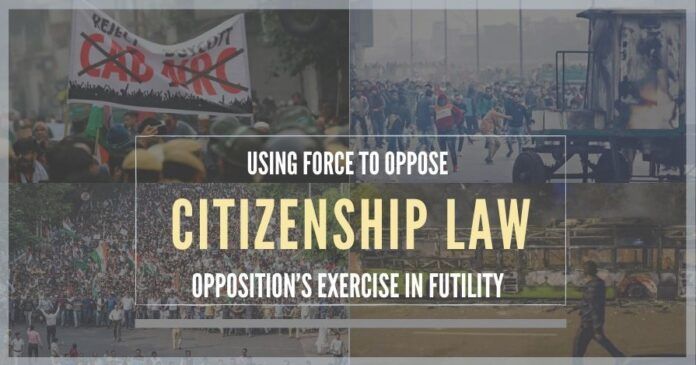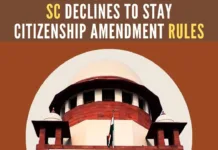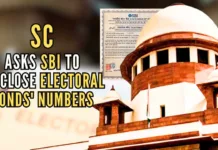
The Opposition’s are creating situations that are harmful to the federal spirit that, nevertheless, is part of a unitary system which India essentially is, by the Constitution’s design. There are Other righteous way to Oppose than Futility.
A few sensible voices have, rather unexpectedly, emerged from within the Congress camp in the midst of the protests against the Citizenship Amendment Act (CAA). They point to the futility and even unconstitutionality of the demands by certain State regimes that they would not allow the implementation of the Act in their respective States, and of the resolutions passed by a few State Assemblies against the legislation.
Incidentally, he has also filed a petition against the Act in the Supreme Court. His remark is significant given that his party’s government in Punjab has passed a resolution in the Assembly against the Act.
Senior Congress leader and one of the country’s leading lawyers, Kapil Sibal has categorically stated that States could not refuse to implement a Central law. Such a refusal is “not possible and is unconstitutional”, he stated. He added that a confrontation of this sort “is going to be problematic and going to create more difficulties”. It is significant that he made these remarks in Kerala whose Assembly recently adopted a resolution against the CAA. Besides, the Left Front government there has resolved not to implement the law. Sibal, however, said that States were free to pass resolutions against the Act and demand its withdrawal.
But another senior Congress leader, Jairam Ramesh, has problems with even such resolutions. In a conversation with a leading national English daily, he said that he was “not sure if State resolutions on CAA can stand scrutiny”. He observed that the right way to protest is through the constitutional process, and pointed out that the Congress had followed it by voting against the Bill in Parliament. Incidentally, he has also filed a petition against the Act in the Supreme Court. His remark is significant given that his party’s government in Punjab has passed a resolution in the Assembly against the Act.
These are precisely the same points Kerala Governor Arif Mohammad Khan had made, which drew sharp criticism from the opposition parties, including the Congress and the Left. He said that States are bound to accept and implement Central laws (passed by Parliament) on subjects that are exclusively in the Union List. He had also questioned the use of public money by the Kerala government to challenge the Act in the Supreme Court, though he admitted that people had the right to oppose and challenge the issue in the court. “People put forward their opinions and they have the right to protest”, he said at an event in Jaipur, adding, “But one point needs to be kept in mind. We have the right to give our opinion, stick to it, protest for our stand. But we don’t have the right to break the limits of the law, or try to influence decisions by displaying our muscle power.”
Jairam Ramesh had made another pertinent point. He said that the Congress (or for that matter any other party) must take care not to be seen as leading or provoking the protests that are taking place, which in his view, are purely people’s movement. He needs to, therefore, advice his own colleagues. Shashi Tharoor and Mani Shankar Aiyar had not only attended a gathering of demonstrators in Delhi but also addressed it. Aiyar had, in his characteristic uncouth manner, even indirectly termed the Modi government as a “murderer”. Media reports have begun to emerge that some of these protests have been orchestrated and paid for, rather than being spontaneous in nature.
The CAA has been passed by Parliament which has representation from various parties, not just the Bharatiya Janata Party. In fact, the relevant Bill received support even from parties outside the NDA fold.
It beats reason as to why the sit-in protests continue to happen when the solution lies elsewhere — with the judiciary. A spate of petitions against the CAA is already before the apex court for a decision, and any closure can happen only there, not on the streets. Protestors have made their point and they ought to pull back now. if they refuse, it is because they are being incited by individuals with petty and, in some cases, dangerous agendas that go beyond their opposition to the Act. Issues of communal conflict, the so-called idea of India, slogans of freedom of Kashmir, fundamental rights etc have been dragged into the debate.
It appears that the very people leading or inciting the protests in the name of saving the Constitution of India have little regard for the scheme of the Constitution. The first is that the CAA has been passed by Parliament which has representation from various parties, not just the Bharatiya Janata Party. In fact, the relevant Bill received support even from parties outside the NDA fold. The second is that there is Article 131 of the Constitution, under which States can approach the apex court on disputes they have with the Centre. Both the Kerala government as well as the Chhattisgarh regime have exercised that right — the latter against the National Investigation Agency Act on the ground that it impinged on the rights of the State in matters of law and order. Article 131 gives the Supreme court the authority to adjudicate on disputes between the Centre and the State or between States or between the Centre and State on one side and other States in the opposing camp. The verdict on the legality of the CAA, therefore, rests with the Supreme Court, and neither the States nor protestors should hope to arm-twist the Union government by threats of non-implementation or violence.
It is evident, thus, that those who are refusing to implement the CAA — and this includes the Mamata Banerjee government in West Bengal — have jumped the gun. Worse, they are seeking to muddy the waters further by linking CAA to the National Population Register (which is a regular exercise undertaken by Union governments) and a nationwide National Register of Citizens (something that has neither been discussed nor officially announced by the Centre). In their pursuit to protect their very limited turfs, opposition parties are misreading the larger mood of the nation. More worryingly, they are creating situations that are harmful to the federal spirit that, nevertheless, is part of a unitary system which India essentially is, by the Constitution’s design.
Note:
1. The views expressed here are those of the author and do not necessarily represent or reflect the views of PGurus.










